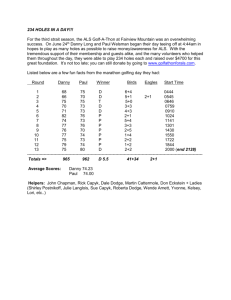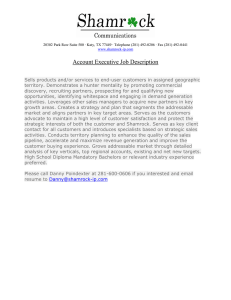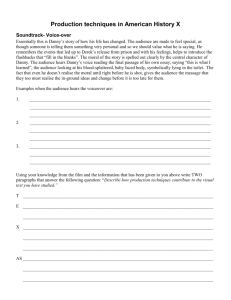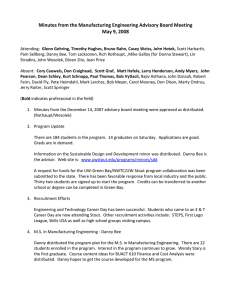1
advertisement
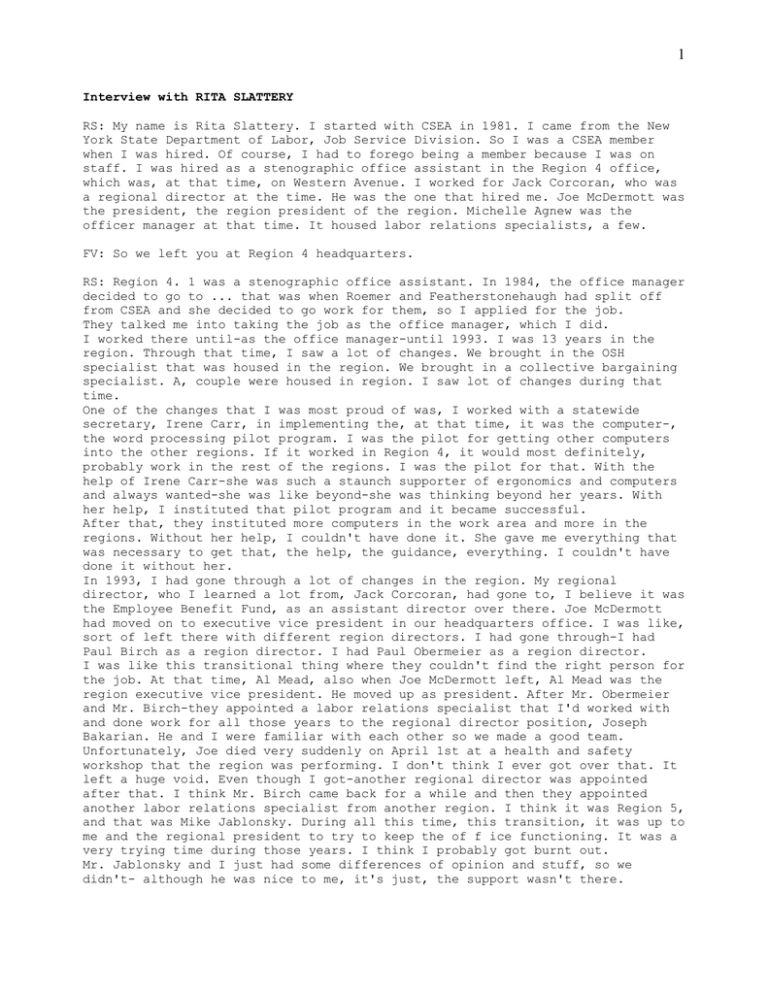
1 Interview with RITA SLATTERY RS: My name is Rita Slattery. I started with CSEA in 1981. I came from the New York State Department of Labor, Job Service Division. So I was a CSEA member when I was hired. Of course, I had to forego being a member because I was on staff. I was hired as a stenographic office assistant in the Region 4 office, which was, at that time, on Western Avenue. I worked for Jack Corcoran, who was a regional director at the time. He was the one that hired me. Joe McDermott was the president, the region president of the region. Michelle Agnew was the officer manager at that time. It housed labor relations specialists, a few. FV: So we left you at Region 4 headquarters. RS: Region 4. 1 was a stenographic office assistant. In 1984, the office manager decided to go to ... that was when Roemer and Featherstonehaugh had split off from CSEA and she decided to go work for them, so I applied for the job. They talked me into taking the job as the office manager, which I did. I worked there until-as the office manager-until 1993. I was 13 years in the region. Through that time, I saw a lot of changes. We brought in the OSH specialist that was housed in the region. We brought in a collective bargaining specialist. A, couple were housed in region. I saw lot of changes during that time. One of the changes that I was most proud of was, I worked with a statewide secretary, Irene Carr, in implementing the, at that time, it was the computer-, the word processing pilot program. I was the pilot for getting other computers into the other regions. If it worked in Region 4, it would most definitely, probably work in the rest of the regions. I was the pilot for that. With the help of Irene Carr-she was such a staunch supporter of ergonomics and computers and always wanted-she was like beyond-she was thinking beyond her years. With her help, I instituted that pilot program and it became successful. After that, they instituted more computers in the work area and more in the regions. Without her help, I couldn't have done it. She gave me everything that was necessary to get that, the help, the guidance, everything. I couldn't have done it without her. In 1993, I had gone through a lot of changes in the region. My regional director, who I learned a lot from, Jack Corcoran, had gone to, I believe it was the Employee Benefit Fund, as an assistant director over there. Joe McDermott had moved on to executive vice president in our headquarters office. I was like, sort of left there with different region directors. I had gone through-I had Paul Birch as a region director. I had Paul Obermeier as a region director. I was like this transitional thing where they couldn't find the right person for the job. At that time, Al Mead, also when Joe McDermott left, Al Mead was the region executive vice president. He moved up as president. After Mr. Obermeier and Mr. Birch-they appointed a labor relations specialist that I'd worked with and done work for all those years to the regional director position, Joseph Bakarian. He and I were familiar with each other so we made a good team. Unfortunately, Joe died very suddenly on April 1st at a health and safety workshop that the region was performing. I don't think I ever got over that. It left a huge void. Even though I got-another regional director was appointed after that. I think Mr. Birch came back for a while and then they appointed another labor relations specialist from another region. I think it was Region 5, and that was Mike Jablonsky. During all this time, this transition, it was up to me and the regional president to try to keep the of f ice functioning. It was a very trying time during those years. I think I probably got burnt out. Mr. Jablonsky and I just had some differences of opinion and stuff, so we didn't- although he was nice to me, it's just, the support wasn't there. 2 Interview with RITA SLATTERY So, at that time, I think I was burnt out and, in 1993, Joseph McDermott was now president with Michelle Agnew being his executive assistant. They approached me to come down to headquarters to work for Larry Scanlon, who was then the executive director-as his administrative assistant. It was a hard decision to make. I probably, looking back on it now, probably should have taken a leave of absence and got my act back together again, but, you know, hind sight is 20/20. So, in January of 1993, I transferred to headquarters after being in the region for 13 years. My heart will always be with Region 4. It always will be no matter what. That’s where I learned the most, where I grew up and it will always be there. In 1993, I began working for Larry Scanlon. Unbeknownst to me, there was-at that time, Danny Donahue was executive vice president and Joe McDermott was president. At that time, I didn't know there was this-it was like a rift between the executive director and the president. FV: Do you know what it was about? RS: No, I don't. I didn’t want to know, either. But, I sort of got put in the middle of it. Unbeknownst to me. I liked Larry a lot. He was very nice to me, but he didn't want me, either. He wanted his former secretary. So, you know, things like that happen. So it was election time again and Mr. McDermott opted not to run for office, which left Danny running for office with his present slate of officers, Mary Sullivan and I think Barbara came at that election. She was selected at that time and so was Maureen Malone. During that time, before the election, they had talked about transitioning people to different positions. Larry had wanted his former secretary, so that left me, where am I to go? That's when-it was in 1996, I became executive secretary, I believe at that time, in the executive offices, working for the executive vice president and the assistant to the president. And at that time, Danny won his election 'and he named his secretary, Kim Hyco, to the position of office manager, assistant to the president. Unfortunately, in November of that year, Kim reached an untimely death and there was another void, another loss for us. It was really hard. Danny had asked me.-and he asked all of us in the executive offices in clerical staff, if we would consider being his assistant in Kim's place. At that point in time, I felt that I hadn't been there that long, even though I knew the history of the organization. I just wasn't comfortable enough to take the position, so I didn't take it. He reached back and got his-what was she, I think she as Joe McDermott’s secretary during his reign, Kelly Garceau, so she was named of fice manager to Danny. So I worked for Mary and Danny brought in as the-when McDermott left-I'm kind of jumping around here-when McDermott left and Danny took over, he put Michelle Agnew in the Employee Benefit Fund as an assistant director up there. He then brought in Marty Lang, who was our mental health, mental hygiene consultant. He worked with us for a while. He lived in Rockland County and the trip was a lot for him. He was making that trip every day. He stayed a few years, I don't know, two or three years and he decided that it wasn't for him. It was then that Danny named Terri Malvin as his executive assistant. So I worked for Terri and Mary a few more years. That brought us up to like 2000, 2001. It was just last year. Danny promoted Kelly, his office manager, to, again, that assistant to the Employee Benefit Fund and Danny then asked me if I would move over into her position. I felt-I had been doing a lot of the job by then and I felt more confident, and that's when I moved over as office manager/assistant to the president. I spent the last six months working directly for Danny, overseeing, managing the office. And that's where I... 3 Interview with RITA SLATTERY FV: Can you tell us stories about Danny? To tell stories, so I want to hear some. RS – Danny, when I had the opportunity to be his assistance the first time, I thought, oh, I don't know if I can even work with him. He doesn't seem to be all that-have all his stuff together. He's very disorganized. I don’t know if I can do this. And that was one of the reasons. Honestly that was one of the reasons I really didn't take the job the first time. So, when I finally did get into that position and I started working for Danny, he is the nicest, sweetest guy. Very disorganized. I mean, you gotta read to him, you gotta tell him where he's going, you gotta have maps to where he's going, you gotta have everything, you know .. and I tend to be a little bit on the too-organized side, so with Danny being so disorganized, and changing his schedule from one time here, next time he's-flying there, and you never know where he's going to be from one minute to the next, it was very frustrating to me-in the beginning. But he's such a likeable person. He has that one-on-one personality. He wants you to tell it like it is. He's very honest. I don't really have any bad stories for him except I know one time, somebody put him on a trip, and it wasn't me. He thought he was in Charleston, SC, and he was in Charlotte, NC, vice versa. He was not happy (laughs). But Danny, it takes a lot for him to get really upset. He lets his managers manage. He's very good like that, and he,s about the easiest that I've had to work with. He’s-I really enjoyed the last six months with him. FV: You got any stories about anybody else that we should know? It sounds like you do. RS: Well, Mary’s a little bit ... Mary’s a little bit tough to work with. I worked for her for probably about six years. I knew Mary before, when I was in the region. I didn't know her all that well. Mary has knowledge of the organization like you wouldn't believe. She remembers things. She would be a good candidate to interview. But she is very hard to work for. Some days, she comes in and she's happy-go-lucky. Other days, you know, things bother her. Everything bothers her, so she was a little bit tougher to work for. But I did manage to stick it out until I-and, you know, even working for Danny, I still worked with the officers too. So, it was a learning experience. FV: Did you ever work closely with Danny? RS: Yes, I did. I worked with him when I was in the region. He was a communications associate. FV: He got to a lot of people. RS: Yes, he did. We used to bother him over some of the things that he would do, but he would come back. Held always have an answer, you know. And he and I-I used to do his work when I was first there, his typing. Of course, in the communications field, the typing is a little bit-you don't capitalize certain things and I couldn't get it through my head, and every time I wanted to capitalize it, he would come back and say, “No, you don't capitalize this!" Like president or ... so it was an ongoing battle with Dan and I, but it was all in fun. He was a good guy. He's very family oriented and-his family and his church, and you couldn't ask for a nicer guy. FV: So any other stories about any of these people that yourve mentioned, that you care to tell me? 4 Interview with RITA SLATTERY RS: (Laughs) I remember the one time-I have more stories, I think, about the region than I do about headquarters because that was my whole life for 13 years. Jack Corcoran, he was a bit like Mary in the respect that he has so much knowledge about the organization. I think he and Joe McDermott kind of like were the first. I think the Region 4 office was the first regional office when they started branching out, when headquarters, started branching out to the regions. Yeah, and I think he and Joe McDermott-I remember Michelle always telling me that when they started, they had just a small office and it was just the three of them, and that's how they started. But Jack was a storehouse of information and he was-you just-had to know Jack to appreciate him. He was very cutting in his remarks, he could be. He was up one day, down the next. You never know what mood held be in, but let me tell you, you'd better know how to take shorthand and that's when we took shorthand back in those days. I did all my work by doing shorthand. He dictates all his letters. I remember one time, I was going on vacation and I was the office manager at the time. He always had this thing about saving all his work until the day before you would leave on vacation, so you'd have to rush around at the last minute and get everything together and get all your letters out and everything. Well, it just happened that the day before my last day, I was at home and I cut my thumb on a tin can, and it needed six stitches. Well, when you cut your thumb and have six stitches in, you come in the next day and you can't take shorthand. He was not happy. He was so mean to me for the next month after I came back because he thought I did that on purpose. That's my Jack. But you loved him anyway. And then, one other time, we were moving furniture around in the region (laughs)-I don’t know exactly how it happened but one desk was bigger than another desk and,, of course, all the field reps, as they were called at that time, wanted the bigger desk. So Jack had given it to John Cummings, who was the field rep at that time and, because they were all fighting over-John’s getting the bigger desk, he's been here the longest, he's getting the bigger desk-Jack went in and had it cut of f to the same size as the other desk (laughs). That was Jack. FV: Let’s, get to the big questions here. What are you most proud of in your time with CSEA? RS: I'm most proud of having the ability to start practically from nothing. I mean, I was just a little country girl. I'd just moved to Albany. It was the big city. I came to work for CSEA and I kind of had the chance to move up the ladder, so to speak, for somebody that, I'd never had much education. It was just my work ethic that put me through the ladder, so to speak, and I ended up being the president's officer manager and secretary to the president. FV: RS: And they gave us the opportunity to do that, with the help of other people, like Irene Carr, Joe McDermott, even Jack Corcoran and Mary Sullivan, Danny Donahue, you know, all of them. I couldn't have done it alone, but they saw the potential there, I believe. FV: What do you think about CSEA's future? What does its past tell us about its future? RS: Future with CSEA, I think people need to be more proactive rather than reactive. They need CSEA's computer technology, for example, is still quite outdated. And they need to come to the 21st century. I think they need to know 5 Interview with RITA SLATTERY They-they're aware certain things that are going to happen in the next couple of years, because we've talked about it. Like the state contract's coming up. What's Pataki gonna do? Is he gonna lay off more people? What's gonna happen? They need to get ready for that. They don't need to do it-I find that CSEAthey're crisis oriented. They'll do it right there when they're in crisis mode and they operate the best in crisis mode. They don’t look to the future to try to stop some of that. FV: RS: Maybe. FV: Anything else you want to tell us before we ... ? RS: No, I've just enjoyed-like I said, I’ve enjoyed my days with CSEA and I think, you know, the organization has been good, to me. FV: Rita, thank you very much. RS: You're welcome. FV: RS: Unhook me. (laughs)
